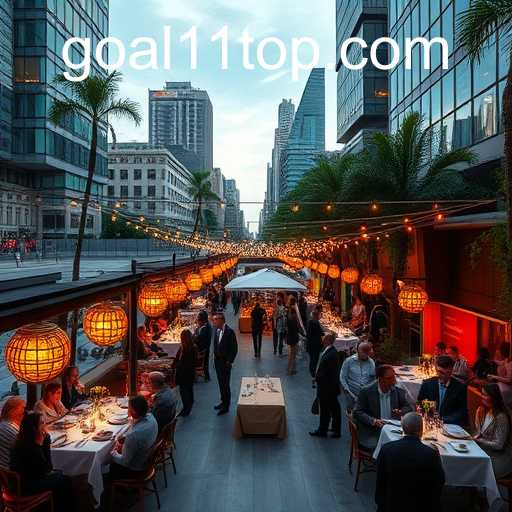Explore the intricate role of exclusive events in promoting Goal11 of sustainable urban living, examining how these gatherings intersect with inclusivity, innovation, and community development.
Exclusive Events and Sustainable Urban Planning: A Deep Dive into Goal11
In today’s rapidly evolving world, the concept of exclusive events has gained significant traction. While traditionally exclusive gatherings may conjure images of elite gala dinners or private concerts for the affluent, their implications stretch far beyond mere luxury. As communities become more interconnected through a digital lens, exclusive events serve as meaningful platforms for collaboration, influence, and, increasingly, sustainability efforts. At the core of this burgeoning phenomenon is Goal11 of the United Nations Sustainable Development Goals (SDGs). This goal, focusing on sustainable cities and communities, provides a rich framework to examine the impact and role of exclusive events in modern society.
The Evolution of Exclusive Events in Urban Landscapes
Exclusive events have transformed from niche pockets of social interaction into larger societal influences. Initially, these events celebrated cultural, culinary, or artistic prowess in insulated environments, becoming a space where tactful networking and collaborative brainstorming could materialize. However, with the advent of globalization and increasing urbanization, exclusive events are now a strategic tool that can drive significant change within urban settings.
Within the context of Goal11, exclusive events have taken on a new imperative to foster sustainable urban environments. Organizers of such events are tasked with balancing the exclusivity that makes these gatherings alluring with the universal desires for sustainability and community development. This creates a unique intersection where urban planners must engage with cultural curators and event organizers to align with the objectives of promoting resilient infrastructures and inclusive communities.
Exclusive Event Strategies Aligned with Goal11
When discussing the intersection of exclusive events and urban sustainability, several strategies can propel these occasions from mere social milestones to agents of urban development and resilience. A crucial consideration in planning such events is the environmental impact. Through adopting eco-friendly logistics, responsible sourcing of materials, and waste minimization initiatives, exclusive events can significantly reduce their carbon footprints, in line with the sub-objectives of Goal11.
A key example of success in this realm is the development of sustainable infrastructure. Exclusive events focused on sustainability often commence with the collaboration of public and private sectors to forge infrastructures that endure beyond the lifespan of the event itself. This includes the promotion of smart buildings, integrated transportation systems, and enhanced green spaces that remain available for continued community use.
The Role of Technology in Enhancing Urban Sustainability
Technology plays a pivotal role in ensuring exclusive events thoroughly embody the goals of sustainable urban planning. With data analytics, event planners can track the environmental impact of their gatherings, providing insights into areas for development and adaptation. Furthermore, the integration of virtual experiences has made it possible to extend the reach and inclusivity of exclusive events beyond physical limitations, thereby enabling broader participation while minimizing environmental strain.
Moreover, the adoption of renewable energy resources in the power supply of events contributes significantly to their sustainability profile. Utilizing solar panels, wind energy, and low-energy consumption gadgets during events ensures resource efficiency and positions exclusive events as leaders in innovation and environmental stewardship.
Creating Inclusive Communities Through Exclusive Events
Another crucial aspect of Goal11 is fostering inclusive and participatory urban environments. Exclusive events, through intentional design and collaboration, can bridge social gaps by being more inclusive and contextually relevant. By engaging with local communities and inviting participation from diverse social groups, these events transcend their exclusivity, encouraging widespread community integration and participation.
Social inclusion can be exemplified in events that prioritize accessibility and diverse representation. Initiatives that emphasize inclusive mobility, such as preferential entry for individuals with disabilities or planning venues accessible to all, ensure that exclusive events accommodate varied human experiences. This aspect not only aligns with the social equity focus of Goal11 but also harnesses the uniqueness brought forth by diverse participants.
Economic Opportunities Emanating from Exclusive Events
Economically, exclusive events present opportunities for growth both in immediate contexts and long-term community enrichment. As seen through the framework of Goal11, sustainable cities thrive on diversified and inclusive economic development. Exclusive events can stimulate local economies by necessitating the collaboration of local vendors, artisans, and service providers. By prioritizing local sourcing, these events support the resilience and sustainability of local economies, one of the paramount concerns identified in Goal11.
Additionally, these events often leave a lasting economic impact by placing cities on the global map, attracting investments, tourism, and opportunities that promote regeneration and stimulate local cultural industries.
Concluding the Role of Exclusive Events in Urban Sustainability
While the glamorous allure of exclusive events is undeniable, their evolving position as catalysts for sustainable urban development cannot be overlooked. By aligning with the comprehensive objectives of Goal11, these events are positioned uniquely to drive forward innovations in sustainable urban design, productively contribute to local economies, and foster inclusive urban cultures. In reimagining the role of exclusivity within society, it becomes imperative to focus on creating spaces where innovation and inclusivity intersect, crafting urban environments that are not only livable but truly vibrant and sustainable. Thus, the reformation of exclusive events presents a promising trajectory towards cities and communities that thrive in harmony, embodying the principles of sustainability while celebrating human achievement and collaboration.




